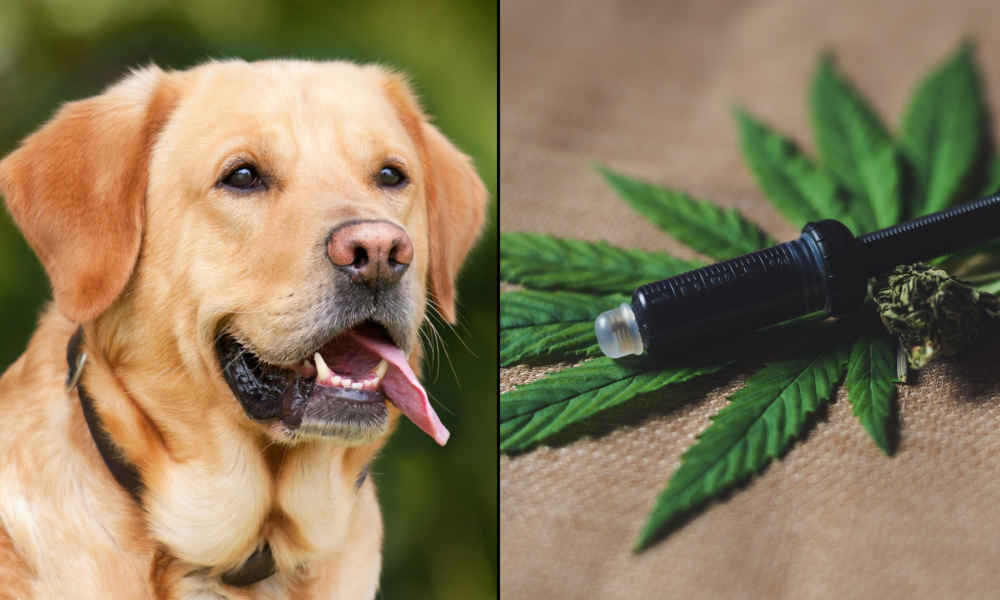Cannabis appears to be a “viable alternative” treatment option for dogs suffering from a common skin disease—especially if they experience adverse side effects from conventional steroid therapies—according to a new case study.
Researchers at the Federal University of Santa Catarina in Brazil published their findings in the journal Frontiers in Veterinary Science this month, detailing the efficacy of full-spectrum CBD oil on a dog with the autoimmune disease discoid lupus erythematosus (DLE).
The condition, which causes hair loss and redness that could progress to lesions, is typically treated with corticosteroids and other medications that can put a strain on a dog’s liver. That’s what was happening with the two-year-old canine at the center of the new case study.
A veterinarian prescribed a full-spectrum oil with a 2:1 THC:CBD ratio, which was administered orally—at first, one drop per day for three days and gradually increasing it “until the optimal dose for symptom control was identified.”
“Within a few weeks, the dog exhibited significant improvement in dermatological signs, accompanied by a concurrent improvement in liver function,” the study says. “Interestingly, the owner reported an improvement in the dog’s behavior shortly after discontinuing prednisolone and within the first day of receiving the cannabis oil.”
“Cannabis derivatives, beyond their pain-relieving prowess, are emerging as potential knights in shining armor against inflammation and immune system overwork in the veterinary world,” the discussion section says. “Unlike traditional drugs, these compounds dance with the body’s own endocannabinoid system (ECS), a master conductor of cellular harmony, homeostasis and diverse functions.”
They added that a key benefit of using cannabis over corticosteroids is that the latter is “limited” to short-term use. In contrast, cannabis products “lack significant side effects and are safe for long-term usage.”
“Throughout the treatment period, the dog exhibited robust overall well-being, maintained an active and playful disposition, and experienced a stabilization of its dermatological signs,” they said. “No corticoids were needed during the [Individualized Cannabinoid Therapy].”
“This offers initial indications that cannabinoids could potentially serve as a viable and health-conscious alternative to extended therapeutic approaches for DLE in dogs,” the case study concludes, while noting that additional research is need to identify optimal dosing and assess long-term efficacy.
“While the song of cannabis therapy for DLE in dogs holds immense promise, we must continue listening closely, gathering more evidence, and refining the tune,” the researchers said. “This case report adds its verse to the growing chorus, paving the way for future research and potentially offering a new rhythm of hope and a haven from the long-term reign of corticosteroids for dogs battling this challenging disease.”
Meanwhile, another study that was published last month found that dogs that receive daily doses of CBD see “significant reductions” in stress and anxiety related to car travel.
Other studies have demonstrated benefits of CBD such as reduced frequency of seizures among dogs who receive the cannabinoid. Also, a study published in 2018 found that dogs with arthritis see improvements with CBD treatment.
Last August, the U.S. Department of Agriculture (USDA) found that cows that are fed hempseed cake retain very low concentrations of THC and CBD in their bodies, indicating that meat products from hemp-fed cattle are safe for human consumption.
Another federally funded study published in 2022 found that feeding cows hemp reduces their stress. Researchers have also looked into how CBD affects stress and pain in horses.
The Food and Drug Administration (FDA) sent warning letters to a series of businesses marketing CBD products for animals in 2022, cautioning that there’s a “lack of data on what levels of potential residues are safe for a person consuming the foods that come from CBD-treated animals.”
Meanwhile, late last year, the governor of New York vetoed a pair of bills that would have allowed hemp seeds to be included in animal feed for pets, horses and camelids such as llamas and alpacas—citing a lack of information about the safety of such uses, which she wants the state to study in an “expeditious manner.”
Declining Treatment Rates For Cannabis Use Disorder Were Concentrated In States With Legal Marijuana Sales, Study Finds
Read the full article here

